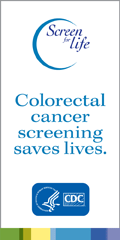Colon (colorectal) cancer is cancer that occurs in the colon or rectum. The colon is the large intestine or large bowel. The rectum is the passageway that connects the colon to the anus. It is the second leading cause of cancer deaths in the United States.
What can you do? Get screened!
Getting screened is the best way to prevent colon cancer. Screening identifies precancerous growths, called polyps, in the lining of the colon. Your doctor can remove polyps before they cause problems. Screening tests can also find colon cancer early, when treatment works best.
Who should get screened for Colon Cancer?
All adults between ages 45-75 should begin screening for colorectal cancer, according to the U.S. Preventive Services Taskforce recommendations. For people ages 76 – 85, continuing screening is a choice based on many factors. You may consider things like your personal preference, overall health, and prior screening history. If you have a personal or family history with colorectal cancer, colon health problems, or are at increased risk of developing colorectal cancer, talk to your doctor about when to begin screening, which test is right for you, and how often you should be tested.
Screening Options
There are many ways to screen for colon cancer. Talk to your provider about the screening that works best for you:
Stool-Based Tests (Recommended every year*)
- There are multiple stool-based tests that can be used to screen for colorectal cancer, including:
- Highly sensitive fecal immunochemical test (FIT)
- Highly sensitive guaiac-based fecal occult blood test (gFOBT)
- Multi-targeted stool DNA test (mt-sDNA)
- *This test is recommended every three years.
What to expect: Using the test kit from your provider, you collect a sample of your stool (feces) at home and return it to your doctor. Each test will come with instructions on how to use that specific test. If there are traces of blood or abnormal sections of DNA in your sample, this may be a sign that polyps or cancer are growing in your colon or rectum. If the result of any of these tests is positive (abnormal), you will need to get a colonoscopy to see if you have cancer.
Flexible Sigmoidoscopy (Recommended every five years)
What to expect: The doctor uses a camera to look for polyps in the rectum and the lower third of the colon. It does not look in the entire colon. It’s important that the colon and rectum are emptied before this test, so your doctor will give you instructions on how to prepare. If polyps are found during the test, the doctor may remove them. They may then be looked at in a lab. If a pre-cancerous polyp (adenoma) or colorectal cancer is found, you will need to have a colonoscopy later to look for polyps or cancer in the rest of the colon.
CT Colonography (Recommended every five years)
What to expect: Special computer programs use both x-rays and a CT scan to make three-dimensional pictures of the colon and rectum. It’s important that the colon and rectum are emptied before this test, so your doctor will give you instructions on how to prepare. If polyps or any other suspicious areas are found during a CT colonography, you will need to get a colonoscopy to remove them or explore the area more fully.
Colonoscopy (Recommended every 10 years)
What to expect: The doctor uses a camera attached to a long, thin tube to look for polyps in the rectum and the entire colon. The colon and rectum need to be empty and clean so your doctor can see the inner lining during the test. You will be given instructions by your doctor on what you need to do to prepare for your colonoscopy (“bowel prep”). It’s important to read these instructions carefully a few days ahead of time, so you can make sure you have everything you need. Colonoscopy is recommended as a follow-up test if anything unusual is found during one of the other screening tests.

